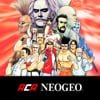The biggest successes SNK had in the early years of the NEOGEO platform were in the fighting genre. With Capcom’s Street Fighter II rocketing the genre into the stratosphere, even middling entries were enjoying disproportionate popularity. SNK had a few of those, but it also had one extremely powerful ace up its sleeve: Takashi Nishiyama. He had started his career at Irem before moving to Capcom, where he had created Street Fighter. While he had left the company before its far more popular sequel arrived, he soon found a new home at SNK. Indeed, the NEOGEO was partly his idea, and for his part he offered up his own spiritual successor to Street Fighter in the form of Fatal Fury: King of Fighters.
Of all of the fighters SNK offered up on its new platform, Fatal Fury was the biggest success. It had a very different feel from its cousin Street Fighter II: The World Warrior, but it certainly wasn’t lacking in mechanical depth or interesting characters. It’s not hard to figure out why SNK fast-tracked a sequel for release in the following year, though it would have to make do without Nishiyama, who was already on to other responsibilities. Fortunately, Fatal Fury 2 would benefit from being able to borrow some ideas from Capcom’s ground-breaking title. The result was a fusion of the elements that made the first game so interesting and aspects that were quickly becoming codified within the genre.
The sequel addressed the biggest shortcoming the first game had when stacked against Street Fighter II by expanding the roster of playable fighters from three to eight. Among the new characters was a kunoichi named Mai Shiranui, whose bouncy personality and, er, other bouncy elements made her a big fan favorite almost immediately. Other major additions include the taekwondo master Kim Kaphwan and a new big bad named Wolfgang Krauser. It was another big success for SNK, but there were more lessons to learn from Capcom that would be picked up for the following year’s Fatal Fury game.
Capcom had hit it big with Street Fighter II, and it seemed hesitant to slap a new number on any follow-up. At the same time, there was money on the table and Capcom wasn’t about to leave it there. Thus, four iterative follow-ups were produced to keep the quarters flowing, each one taking what had already been built and adding a little extra on top. This was the approach SNK would take for 1993’s Fatal Fury Special ($3.99). This game uses Fatal Fury 2 as a basis and makes a number of improvements and additions. The boss characters from the previous game are now playable, and the three characters cut from the original game have been restored. The gameplay speed has been increased, and a new combo system has been implemented to bring things ever closer to the Street Fighter II standard.
There was also an interesting secret in Fatal Fury Special. The main character of one of SNK’s other popular fighters, Ryo Sakazaki of Art of Fighting, made a special guest appearance in the game. Should the player beat all fifteen opponents without losing a single round, they’ll face off against Ryo after felling Krauser. Defeating him added him to the playable roster, and it was this fun little trick that served as the seed for The King of Fighters ’94, a mega-crossover of SNK characters that kicked off SNK’s bread and butter series from then on. That was all in the future, of course. In the present, Fatal Fury Special was the most successful game yet in the Fatal Fury series.
In the here and now, I would argue there are better games in the Fatal Fury franchise, but Fatal Fury Special is certainly a great one. I’d certainly recommend it in a general sense. Of course, we have to deal with the usual Arcade Archives issues when it comes to fighting games. I’ll go through them again for the benefit of anyone who is new to these reviews, but if you’ve read one of these before you know what I’m going to say.
Using touch controls with any of SNK’s fighting games is always going to be a bit of a challenge. You can have some fun with it, but it’s less than ideal. If you have an external controller and don’t mind using it, then you have nothing to worry about. The game plays very well that way. Multiplayer is also limited to those who have the right set-up. You’ll need a couple of external controllers, plus a display you feel comfortable enough having you and a friend crowding around. No wi-fi multiplayer and certainly no online multiplayer.
As a result of these demands, I imagine most people who buy this game will be playing against the CPU with touch controls. It’s hardly the best way to enjoy a game like this, but I won’t say you can’t enjoy it. You can turn down the difficulty all the way if you like thanks to the robust set of options Hamster has included here, and you might get some extra enjoyment out of the usual Score Attack and timed Caravan modes. And hey, if you can beat Krauser with touch controls then you have my respect. That and a buck won’t even get you a can of Coke these days, but you’ll have it.
Anyway, that’s where we’ll park this one. Fatal Fury Special isn’t the very best fighting game we’ve seen in the ACA NEOGEO line so far, but it’s certainly in the upper tier. It unfortunately has to deal with all the usual problems that come with fighters in this line, but I didn’t exactly expect Hamster to solve that problem at this point. If you’ve found some entertainment in prior NEOGEO fighters adapted to mobile, you’ll likely get some here as well.

No responses yet